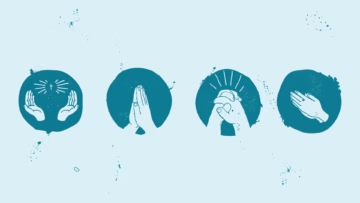
For more than 30 years, I’ve incorporated fasting as an integral part of my spiritual formation. One day per week, one week per month, and one month per year, I abstain from things that I would otherwise enjoy. Additionally, I fast sometimes for very specific purposes as I sense the Holy Spirit directing. Those occasions might be for a day, forty days, or longer. They’re often private, but occasionally they are public.
As could be expected, three decades of regular fasting has provided several insights, as well as some great stories. I’d like to share just a few.
Fasting is a weapon of spiritual warfare.
In the Bible, it is often paired with prayer. Somehow, someway, in God’s economy, fasting enhances our prayers. The point I want to stress, however, is that the enemy fights back. When Jesus entered the wilderness following his baptism to fast and pray, the enemy was also there. When I began my fasting pattern, on the very first day, someone knocked at my door and delivered one of my favorite desserts – nice gesture, awful timing.
That brings me to my second observation.
Fasting is not natural or easy.
Scripture never lists it among the gifts. Like other types of exercise or practice, intentionally abstaining from satisfying our appetites and desires requires discipline. The easy path in life (or so it seems) is to eat, sleep, and pursue happiness. Of course, if that’s all that we do, the consequences are inevitable because we reap what we sow. A healthy and productive spiritual life will always include a variety of spiritual exercises to make us fit for the good fight. When I casually asked a pastor what he was giving up during the denomination’s annual Week of Prayer and Fasting, he replied, “Fasting isn’t my gift.” Whereupon I informed him that it’s a discipline that he would do well to embrace.
Fasting is a spiritual strength builder.
Winning the good fight occurs in the small battles before the big ones. God is aware of that. The created order is his design, correct? In the New Testament, our spiritual life is compared to a wrestling match. I was not a successful wrestler, but that only applied to other wrestlers of equal weight or heavier. Our college 118-pound wrestler was great. Yet, terrible as I was, at 177 pounds I could shake him off me like a flea. I’ve learned that God matches us with spiritual opposition roughly equal to our capacity. Master a weight class and the next match is with something heavier. Fasting can serve as a reality check in that regard. Often, our self-assessment is inaccurate as far as our capabilities.
One year, during the days approaching the Week of Prayer and Fasting, I was feeling strong and self-confident. I prayed, “Lord, show me what you would like me to fast this year.” In my mind I was sure that he would ask for something big and significant. In my heart I heard, rather clearly, “Mt. Dew.” Long story short, I found myself arguing with God about his response. Three times, though, I clearly heard Mt. Dew. It was then that I realized I wasn’t prepared to deal with weightier matters while I was caught in sugar’s grip. Intentional fasting helped in identifying and overcoming something that had enslaved me without my recognition. The good news is, I gained my freedom and moved up a few weight classes.
Fasting is a sacrifice.
Along with its benefits as a discipline, fasting is an offering. To be a worthy sacrifice, it must actually cost us something, and our motivation needs to be pure. We should give our best. Abstaining from food to lose weight or avoiding intimacy because we’re upset with our spouse are not examples of fasting. God weighs the intent of our hearts.
I really blew it one time, and God let me know it – in his own loving, but firm way. A Sunday School teacher called me and asked to meet. He recommended Pizza Hut. I was fasting food at the time, but I rationalized that I was not under the law. Fasting was my personal choice, and I could begin and end as I saw fit. So, I went to Pizza Hut. We had a productive meeting, and I enjoyed the buffet lunch. However, as soon as I returned to my office, I noticed my Bible lying open on the corner of my desk. I didn’t remember leaving it there, let alone open. My eyes fell directly on these words: “You cannot fast as you do today and expect your voice to be heard on high.” (Isaiah 58:4) Lesson learned.
Fasting is giving up something good.
The things from which we choose to abstain can be almost anything except sinful behaviors. I was a bit disappointed when I searched the Internet for articles about the practicalities of fasting. The overwhelming majority of available information focused solely on food. The Bible, however, clearly references other types of temporary abstinence directly connected with prayer. Marital couples are instructed to not abstain from sexual relations unless it’s by mutual consent and for the purpose of prayer. (1 Corinthians 7:5) By extrapolation, I think we could offer to God our social media time, news media time, favorite “whatever” time. In my geographic region I might suggest giving up a week of hunting or fishing. (But, then, I might be shot.)
As mentioned above, abstaining from sin does not count as fasting. Fasting is a temporary situation. It’s generally expected that we will rightly resume doing whatever it is that we have stopped for a season. By contrast, sinful behaviors are to be overcome and permanently eradicated. Fasting is an exercise that can help us build the strength that we need to live a chaste life, but there’s no such thing as fasting lying, adultery, grumbling, etc. We don’t just take a break from those things; we kill them.
Fasting is done alone and together.
One of the rationales I’ve heard for not participating in a corporate fast is that Jesus told us to hide the fact that we’re fasting. (Matthew 6:16-18) While that’s true, we must also consider the context. Jesus was speaking directly to the issue of making worship about ourselves. None of our offerings to God are meant to exalt ourselves. Two other practices that Jesus decried were praying for show and giving money for show. Like those things, however, fasting is both a private and a public activity. Note my earlier reference to sexual relations. That specific fast requires collaboration, but it does not merit publicity.
Do not be mastered by anything.
Paul wrote to the church in Corinth and said, “All things are permitted for me, but not all things are of benefit. All things are permitted for me, but I will not be mastered by anything.” (1 Corinthians 6:12) Fasting is an exercise that increases our spiritual awareness, expands our freedom, and deepens our commitment – among many other benefits. I very strongly urge making it a regular part of worship.
Additional Fasting Resources
- “Fasting for Beginners” – Desiring God
- “Fasting and Prayer Guide” – Faithward
- Excerpt from “When the Righteous Pray,” published by BIC U.S., 2017
- “Hold the Desserts: A Lenten Reflection” – Heather Brickner


